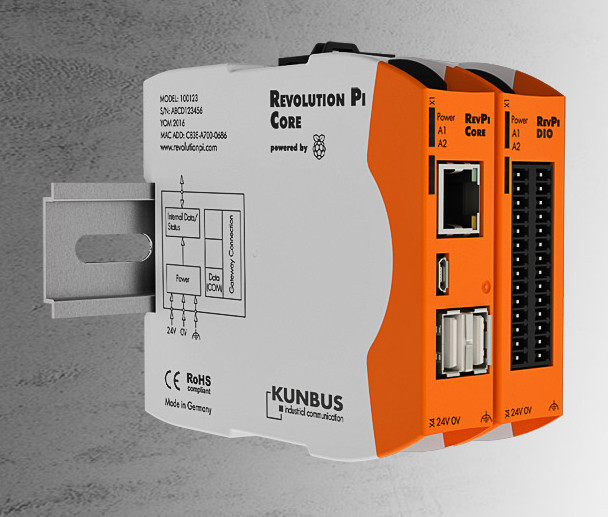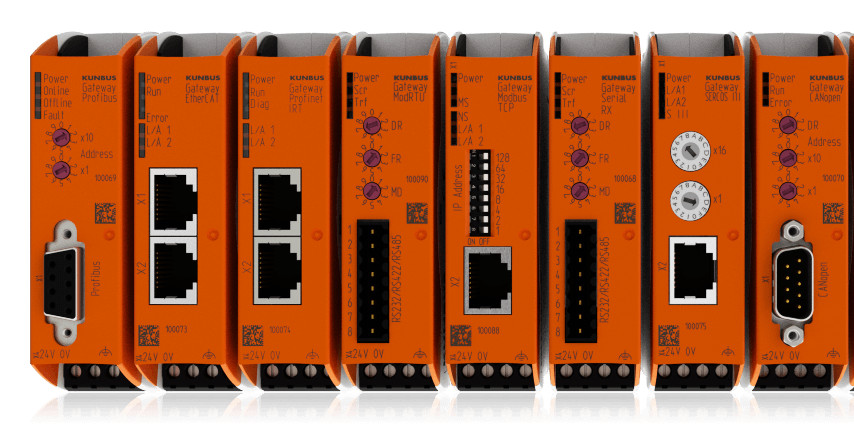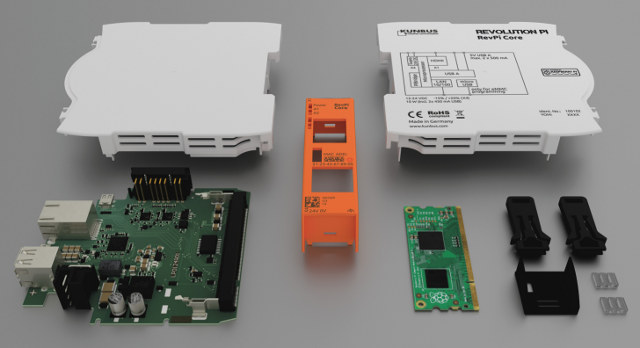Kunbus, a German company specialized in industrial network solution, has decided to design an industrial system based on Raspberry Pi Computer module supporting variable power supply, a wide temperature range, DIN rail mounting, etc, as well as corresponding digital I/O modules and fieldbus gateways.
 RevolutionPI RevPi Core specifications:
RevolutionPI RevPi Core specifications:
- SoC – Broadcom BCM2835 ARM11 processor @ 700 MHz
- System Memory – 512 MB
- Storage – 4GB flash
- Video Output – Micro HDMI port
- Connectivity – 10/100M Ethernet port
- USB – 2x USB 2.0 host ports, 1x micro USB port
- Misc – RTC, 3x status LEDs (2 programmable)
- Power Supply – 10.7 V to 28.8 V; polarity protection; 4 kV / 8 kV ESD protection & EMI passed (according to EN61131-2 and IEC 61000-6-2), surge and burst tests passed
- Power Consumption – Max: 10 Watts including 2 x 450 mA USB load; typ.: 4 watts.
- Dimensions – 96 x 22.5 x 110.5 mm (Polycarbonate case)
- Housing type – DIN rail housing for DIN rail version EN 50022
- Weight – 108 g
- Protection class – IP20
- Temperature Range – Operating: -40 °C to +55 °C (exceeds EN61131-2 requirements); storage: -40 °C to +85 °C (exceeds EN61131-2 requirements); N/B.: No guarantee that the system can start at less than 30 °C with a 24V power supply.
- Humidity – up to 93% (non-condensing) @ 40°C
The system runs Raspian Wheezy with RT-patch for Linux kernel 4.1.13.
Beside RevPi Core described above, the company also offers three different galvanically isolated “RevPi DIO” digital IO modules with a 28-pin I/O connector as shown in the first picture, as well as RevPi Gates gateways supporting industrial communication standards including Profinet, Profibus, EtherCat, Modbus, Sercos, CANopen, and more. RevPi DIO and Gates are connected to RevPi core through a overhead Pi Bridge connector allowing two expansions per RevPi Core.

You can find the full details on Kunbus RevolutionPi microsite, and purchase RevolutionPi RevPi Core (169 Euros), DIO modules and gateways on their webstore.
Thanks to Sander for the tip.

Jean-Luc started CNX Software in 2010 as a part-time endeavor, before quitting his job as a software engineering manager, and starting to write daily news, and reviews full time later in 2011.
Support CNX Software! Donate via cryptocurrencies, become a Patron on Patreon, or purchase goods on Amazon or Aliexpress






Raspberry BCM2835 chip is available to all , thought they exclusively make only for the raspberry foundation
@varghese
Available to all? I’m not sure. Kunbus did not use BCM2835 directly on their custom board, but instead they used Raspberry Pi Compute Module sold by Raspberry Pi Trading.
Hmmm…all the fieldbus modules are slaves, not masters, but they do have a good selection, including Profibus IRT and Ethernet Powerlink. Pricing is reasonable for industrial, but only allowing 2 expansions is very limiting.
Other than using a RPI, what benefit is there over prevous means?
@TonyT
Depending on the Ethernet chip on the main board they could run “software” fieldbus masters on the “core” module. All they need is RT kernel and efficient ethernet driver.
LOGI.CAD3 (the PLC solution that they use) have some references to acontis EtherCAT master so is seems probable.
In fact they only need one fieldbus slave in given machine and one or more IO modules. They have RS485 on the interconnection bus so it could accept multiple “slower” modules.
I am quite interested which company provides the fieldbus slave solutions – I suspect they rely on some proven name in this area – anybus, hilscher?
A BeagleBone version would be far more useful
@JM
Yes indeed. Ethercat slave could be implemented using the PRUs of the Sitarta.
Somewhat related. Somebody has implemented Modbus slave on ESP8266 -> http://pdacontrolen.com/update-esp8266-industrial-modbus-tcp-ip/
They’ve now launched RevPi Core 3 equipped with the Raspberry Pi Compute Module 3
Very interesting bit about how heat relates to CPU core count too CNX, in my humble opinion
” The resulting fan-less design cools by convection through vent holes and all four cores can run at full speed at ambient temperatures under 20°C. Above this, the Broadcom BCM2837 processing chip has automatic clock throttling.
Tested ambient temperature figures with 100% processing are:
20°C 4 cores 1.2GHz
25°C 3 cores 1.2GHz, 1 core 1.1GHz
40°C 4 cores 1GHz (or at least 1 core 1.2GHz)
50°C 4 cores averaging 700MHz (or at least 1 core 1.2GHz)
65°C either 4 or 1 core in 400MHz ’emergency mode’ (300MHz for longer) ”
Ouch ! Hot